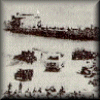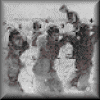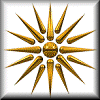
Now it is necessary to go back a little into the earlier part
of the fourth century to glance at the rise of Macedon and its
conquerors. At the opening of the century Macedon was still almost
uncivilised; it was ruled by a monarch surrounded wit an aristocracy
of knights very much like the Homeric model. At that time its
knights had begun to acquire enough education to mingle a little
in Greek politics, and Archelaus in particular had the good taste
to invite Euripides and Agathon to his court. Philip II obtained
the throne by suppressing his young ward, the rightful king. At
that time Macedon was overrun by wilder barbarians from the west,
and it was long before Philip could make head against them. He
did so at last by the organising genius which he displayed in
remodelling his army, the astute statesmanship with which he made
and broke treaties, and still more by the wealth he secured and
the use he made of it bribing his enemies. Philip was, in short,
the organiser who occasionally precedes the conqueror and grows
the laurels for his successor to wear. Expansion to the west would
be difficult and unprofitable. To the east lay the important cities
of the Chalcidian peninsulas, the gold-mines of Mount Pangeaus,
protected by the city of Amphiopolis, the rather decrepit kingdom
of Thebes, and the way was clear to the Black Sea and to Asia.
Now this was the life-line of Athens' food supply, and the main
artery of the sea-borne traffic which made the Piraeus a great
port. A conflict was therefore inevitable.
The statesman who led the anti-Macedonian party at Athens was
the orator Demosthenes. His brillieent series of Philippic and
Olynthiac Orations are full of denunciations of the crafty monarch,
full of trumpet-calls to the aincient valour of Athens which sometmes
ring rather hollow to modern ears. Demosthenes was not exceptionally
honest, byut the is no warrent for suspectiong the purity of his
patriotism. He himself set the example of bearing a shield personally
in the ranks, and he must have been concious throughout his public
career that he was in danger of assassination or excecution if
the enemy triumphed. The wisdom of his opposition to Philip has
also been questioned. Events were to prove that these Macedonian
kings were not barbarians; on the contrary, their warmest aspiration
was to be counted as Greeks, and the had, as the frequently testified,
a great love of Greek culture and deep veneration for Athens as
the home of it. This the future was to prove; the present only
showed and foreign monarch devouring piecemeal the interests of
Athens in the north. Perhaps Demosthenes ought to have realised
that Macedon was too strong for Athens, but no one could seriously
expect old Greece to succumb to this upstart without a struggle.
For one thing, Macedon had not and never acquired a relay strong
fleet. But her army was certainly irresistible.
Philip has learned strategy at the feet of Theban Epaminodas.
The army he created included a corps d'élite of
noble horse-guards, and Companions of the King. These were the
earliest first-rate mounted troops in history, and it was by their
means that the dashing exploits of Alexander were subsequently
acheived. For the infantry his great invention was the phalanx.
This was clearly a modification of the deep formation ivented
by Epaminodas. It consisted of sixteen ranks armed wit a spear
21 feet long. They stood in close order so that the points of
the firs five ranks projected from the front to present a bristling
hedge of spears. The remaining 11 ranks, we are gravely informed,
held their spears obliquely in the air to ward off missiles! Let
the military reader find a military justification for this extraordinary
arrangement. To me it seems a further confirmation of my civilian
view that Greek tactics were primarily designed to prevent armies
from running away. We observe that when Alexander took Persian
troops into his phalanx he put 12 ranks of Persians into the lines,
with a row of Macedonians at the rear. In any case troops
standing in close formation armed with weapons seven yards long
must have been useless for any but defensive purposes; and, as
a mater of fact, the victories of Alexander were generally gained
by the lightening charge of the king at the head of his knights.
We need not touch upon the shabby "Sacred War" which
called Philip to enter Greece on the invitation of Thebes. It
was at Chaeronea in 338 that Philip defeated a mixed Greek army
in whose ranks Demosthenes was fighting as a hoplite. Philip was
generous to the Greeks, and especially to Athens. Next year the
darling wish of his heart was obtained, for he was elected president
of a Panhellenic union destined to fulfil his great scheme of
avenging the Persian invasions of Greece by a march into Asia,
or at any rate by the freeing of the Greek cities of Asia Minor.
In the next year he was murdered, and his brilliant son Alexander
has been suspected of complicity in the plot.
The grand idea of Philip's, begotten perhaps from the study of Isocrates, was certainly inspired by the examples of Cyrus and Agesilaus. Unfortunately it was far from arousing any enthusiasm in Greece. Persia itself was a long way off and money could be had from the great king without fighting for it. There was a sordid scramble for bribes among the Greek statesmen. As soon as they heard of Philips death they broke into unseemly jubilation, and voted compliments to his murderers; they hoped that things would return to their own routine, and that there would be no talk of crusades. They has reckoned without Alexander, for it is seldom that a Philip is succeeded by an Alexander.
This young man who conquered the world and died at the age of
thirty-three has quite naturally captivated the imagination of
posterity and formed a mode for ambitious general of later years.
Julius Caesar sighed to think of his inferiority in achievement.
Augustus paid a visit to his tomb, and wore his portrait on a
ring. Napoleon consciously imitated him. As a soldier he was not
only and organised of victory, though of cause he owed a great
deal to his father in this respect, and a strategist with an eye
for a battlefield, but also a dashing cavalry leader, the sort
of man to ride straight for his enemy's king, to be the first
in the breach, and to leap down into the enemy's town. He did
this kind of thing with impunity; he never lost a battle. He was
chivalrous to the ladies. He married a beautiful Eastern princess
called Roxana, he rode a beautiful war-horse called Bucephalus.
If Lysippus and Apelles may be trusted, he had the face of a Greek
god. He had just the touch of dissipation which somehow rounds
off the conception of a popular hero. He had the good fortune
to die young. in the hour of victory.
And what is to be the sober historian's estimate of this dazzling
person? We may minimise his triumphs by suggesting that the Persian
was helpless before him, like ripe fruit waiting to be gathered.
We may suggest with reason that he strove by the most ruthless
means to free himself from the tutelage of the great Macedonian
nobles who were his commanders. We may charge him with conquering
insanely without stopping to organise, and with neglecting his
own kingdom and failing to deal adequately with the political
condition of old Greece. We may point to the extraordinarily rapid
collapse of his empire. But then he died suddenly in the midst
of his work, and left no grown heir to succeed him. In some respects
I think we must all admit that he showed remarkable gifts of statesmanship.
Though half a barbarian by origin, he was an enthusiast for Hellenism,
and his plan, it can be argued, was to spread it at the point
of a spear all over the civilised world. When he destroyed Thebes
he spared one house - The house of Pindar. When he marched over
the burning deserts of Asia, ho took poets and artists in his
train. He would stop his march every now and then to exhibit Greek
athletics and Greek arts to the wandering Orientals. He planted
Greek cities whenever he had time to stop, from Alexandria at
the mouth of the Nile to Candahar (another version of his name).
He had the art which makes a successful apostle, the gift of being
all things to all men except, perhaps, to the Greeks of Greece;
but these he left behind him. In Egypt the land of religion and
mystery, he made a solemn pilgrimage into the desert, and got
himself accepted as the son of the god called by the Greeks Ammon.
In Persia he recognised the merits of the Persian provincial system,
and appointed his own satraps, or even retained existing ones.
He treated Persian women with the deference to which they were
accustomed, and added one to his household in the manner to which
they were also accustomed. His Macedonians murmured at his Oriental
dress and manners, but Alexander was still Greek at heart, the
lines of Homer always rang in his ears., and he fancied himself
as a reincarnation of Achilles pursuing his Phrygian hectors over
the dusty plains of Troy. He was mad, no doubt, to march so far
over the weary deserts into Turkestan, through those dreadful
defiles of the Hindu Kush. Only the mutiny of his army turned
him back when he reached the furthest of the Five Rivers of the
Punjab. And then it was frantic lunacy, or a ruthless resolve
to punish the men who had failed him, to lead his army home along
the burning coasts of the Persian Gulf. When he died he was projection
a navel expedition along the coasts of Africa. Most conquers have
a touch of insanity no-doubt. The sanest of them was Julius Caesar,
and the maddest was Charles XII. But Alexander the Great had lucid
intervals of imaginative statesmanship. It is in this respect
that he differs from the vulgar type of adventurer and stands
among civilising conquers like William of Normandy with his Doomsday
Book, Napoleon with his Code, and Julius Caesar with his Julian
Laws and his calendar. This intellectual suppleness was the mark
of Alexander's Greek education, though it still remains a difficulty
to trace in his career the influence of Aristotle, his tutor.
On his death at Babylon at 323 the whole empire fell to pieces.
After a brief space and a pretence of unity his various generals,
themselves men of the greatest brilliance, sought their own advantage.
Most of them naturally desired to emulate their master and secure
as much of his empire as they could for themselves. Out of the
confusing struggles over the next generation three great kingdoms
gradually emerged: that of Macedonia, warlike and turbulent under
several shortlived dynasties, that of Asia, huge and wealthy under
a line of Seleucids, and that of Egypt, under a long family of
Ptolemies. The subjects were alien, except for some city communities,
the rulers Greek. In the country, no doubt, Oriental life and
language continued, but in the newly-founded town and for the
purposes of government both the language and the civilisation
were Greek. Thus Alexander had done his work. It can be variously
described: either he had added a good deal of the eastern Mediterranean
and the Middle East to the Greek world, or he had linked Greece
firmly to the East. Curious traces of Hellenism are found even
in distant India.
In this world of "the Successors", as the are called, the ancient states of Greece are not altogether negligible. Rhodes continued to be free and rich. Athens, as I have remarked, was occasionally oppressed and sometimes enslaved by the Macedonian rulers to the north, but for the most part she continued as a lively community, conducting her own affairs and vehemently as ever, pretending an independent policy, which, however, could not exist except by playing off one dynast against another. Sparta stood sullenly aloof, joining no confederacies, but dreadfully shrunken in population. I have alluded to her notable experiments at reform in the third century under Agis and Cleomenes. It was ended by the crushing defeat at Sellasia from the Achean Leagues and the Macedonians. Town like Argos and Corinth preserved their liberties by joining the Leagues. Epirus was a new Power rising to fame by the same road as Macedon under and adventurous king called Pyrrhus. He unfortunately turned west instead of east in his search for worlds to conquer, and there met a rising power, a race of real soldiers who made short work of the Greek phalanx, even when supported by heavy cavalry in the form if Indian elephants. It was these Romans who, when they came in due course to return his visit, put "Finis" to this chapter of Greek history, and proceeded themselves to undertake the task of writing the next.
|
|
 |
      |